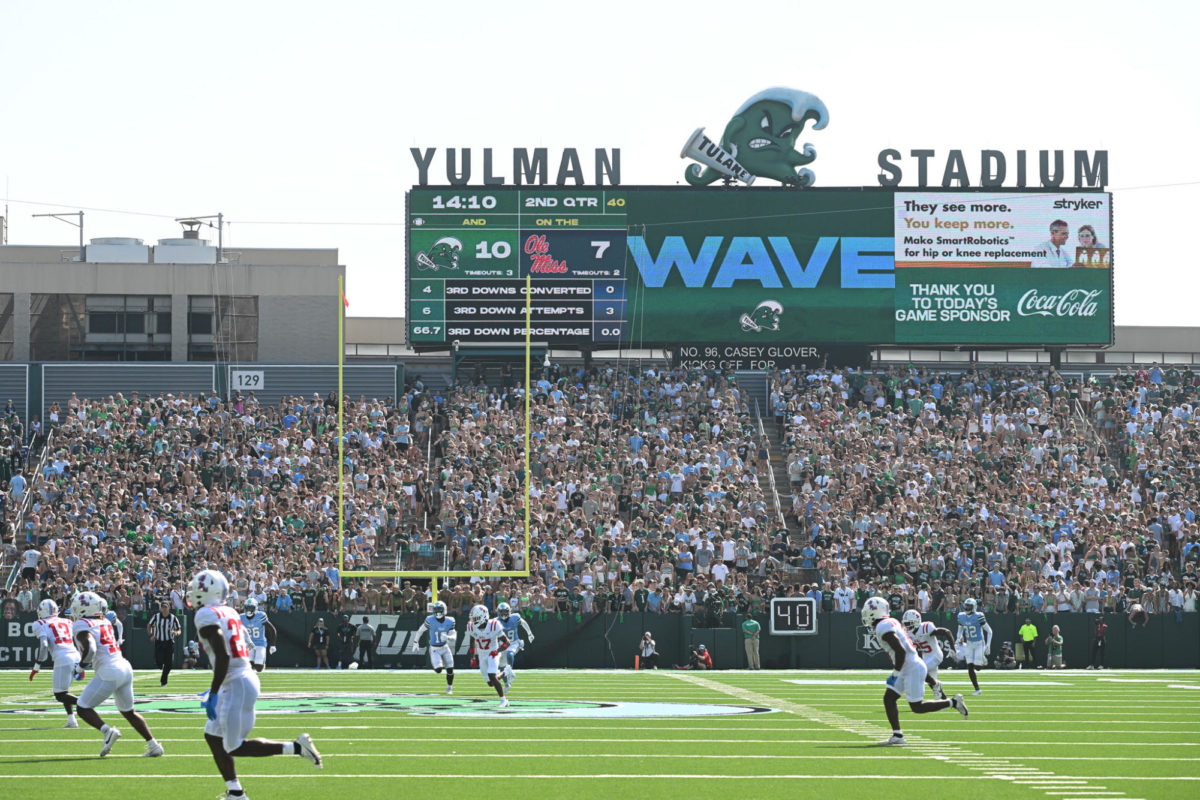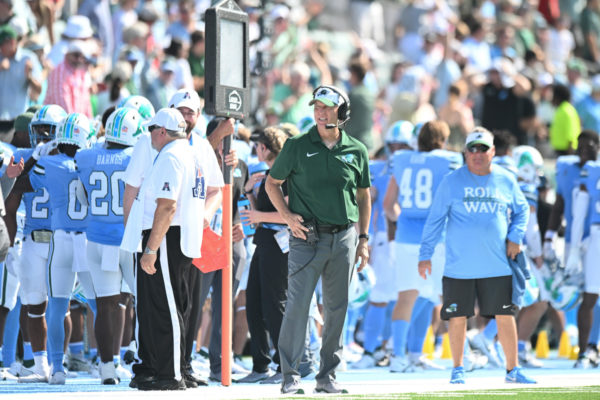
It was only two years ago that Tulane University struggled so much to get students to attend football games that they often offered free perks, like swagboxes and autographed helmets.
But after a historic turnaround and Cotton Bowl win last fall, the student section reached capacity almost an hour before the game against Ole Miss, and crowds packed the sold-out stadium for the entire four quarters.
“This is what everybody’s been waiting for,” Director of Athletics Troy Dannen said.
Dannen said the first two weeks of this season brought the biggest two student crowds Tulane has ever seen. And after a hot season last year, the new 2023 football season plays a major role in determining what the future of Tulane Football will look like.
“What happened last year was incredible,” Todd Graffagnini, who has worked at Tulane since 1994 as the radio play-by-play announcer and now serves as the radio voice for the New Orleans Pelicans, said. “Yulman became a different place to play football. It never was a true home-field type of advantage; there have been moments, but never sustained moments.”
But from mid-October last year on, Graffagnini said, “Yulman became a full-blown home-field advantage.”
Steve Barrios, a commentator who came to Tulane as a football player in 1969 and was inducted to the Tulane Athletics Hall of Fame in 2000, said much of that success comes from leadership.
In his 41st year of doing radio for Tulane, Barrios has seen seven athletic directors and 11 head coaches. He said the future of Tulane Football lies within the hands of the head coach.
“I really believe that coach [Willie] Fritz is the best coach that Tulane has hired,” Barrios said. “The 2022 team is probably the new standard that future football teams at Tulane will be measured by.”
Though it seems like Tulane’s football program turned into a championship team in an instant, Dannen said the success has been years in the making.
Overcoming old adversity
Dannen has been at Tulane since 2015. Under his leadership, Tulane’s football program participated in three consecutive bowl games from 2018 to 2020, which were the first back-to-back bowl games in 128 years of Tulane history.
After the COVID-19 pandemic in 2020 and Hurricane Ida in 2021, Dannen described how there was a change in attitude: they were “going to come out of this thing running,” he said.

In the 2022 season, Tulane did just that.
Last year, the football team won their first-ever American Athletic Conference football championship, the second conference football championship Tulane has had since 1949.
Even through the pandemic, “we didn’t really miss a beat,” Dannen said. “Then we came back from the hurricane.
“Between having been displaced for a month and a lot of injuries in that month because we couldn’t train in the way we needed to train, that season was kind of a lost season.”
While the change might have seemed sudden, Dannen said that it has taken eight years to accomplish this historic turnaround.
“When we talk about it coming so quickly, the switch did flip from an outcome standpoint last year,” Dannen said. “It didn’t happen overnight. There were a lot of things building up to it.”
Student support also drives the team towards success.
“We saw what happens when everybody gets on board,” Dannen said. “The revenue in the stadium is created by the ticket holders, the atmosphere is created by the students. With that conference championship game, most of us say that’s the experience we’ll never forget.”
A new beginning
Historically at Tulane, maintaining a successful football season has proven difficult. The last time Tulane was this successful was in 1998 when the team went undefeated 12-0.
“The one thing that’s happened at Tulane, when there’s been that great year of success, is that it hasn’t been sustained,” Dannen said. But Tulane came back this year with a ranking. They retained Fritz and quarterback Michael Pratt. “There was a lot of expectation that we could sustain it for the first time ever.”
The sudden boom in football attention has brought a new wave of school spirit to campus.
“Just the spirit on campus, we saw it last year, but the positivity on campus just feels different,” Dannen said. “I joke, ‘The food always tastes better on Monday when you win a football game on Saturday.’ It feels like the food has tasted really good for a while now.”
With the change being so sudden, some seniors barely remember having any football experience.

Looking back at his freshman year, senior Ben Perry said he does not remember football at all and feels the school has completely changed.
“I don’t even know if games happened freshman year; I don’t remember it at all,” Perry said. “I remember a little bit sophomore year. It would be somewhat filled in the student sections for the first quarter, and then everyone would leave because we were getting smacked.”
On Sept. 9, crowds of fans rushed to Yulman Stadium to witness the sold-out historic rivalry game versus the University of Mississippi. The overwhelming influx of fans prompted Tulane to enact a new student ticket policy.
Students will now receive emails every Monday before home games with links to request football tickets. Tickets will be served on a “first come, first served basis” until the 4,000 free tickets are claimed.
Other institutions in the AAC have student ticket systems in place, such as Southern Methodist University, where students receive free admission for home games but have to claim their tickets prior.
The football game versus Ole Miss proved to be a major test of whether Tulane could handle the overwhelming demand of students and fans.
“The stadium had never been tested in the way that was tested for that game,” Dannen said. “There were six, seven thousand Ole Miss fans who’d never been here before, so they didn’t know their way around. Then we had the over-demand for students.”
Ole Miss alumnus Bob Hazelrigg described his experience as “an absolute mess.” Hazelrigg said when he received his ticket from Tulane’s Advocate Fan Deck, there were no directions on where to enter.
“I had never been in a situation like that,” Hazelrigg said. “I felt like it was gonna be a European-style soccer stampede. People were just lined up by the hundreds … I don’t think I’ve ever been to any stadium that seated 60 to 100,000 people where it was anywhere near as confusing as that.”
Students also overwhelmed the entrance to the student section, and crowds packed Brown Field an hour ahead of kickoff. Event staff stopped letting students into the stadium half an hour after they opened the gates.
Videos circled on social media of students breaking down the gates, pushing past security guards and climbing trees to get into the stadium. According to students who were present, the Tulane University Police Department confronted students who tried to break through the student entrance gates during halftime.
Junior Samara Patrucnick said she showed up an hour early but left before entering the stadium due to the massive crowd of students pushing the gates at the student entrance. She said entering the stadium felt “poorly managed.”
“Everyone was pushing up against the gate,” Patrucnick said. “At one point, they closed off the gate and refused to let anyone in. Then, everyone behind us was like, ‘Let’s jump the gate and storm into the stadium,’… So we tried to leave before me and my friends got trampled.”
Tulane said in the announcement that the ticket system would reduce congestion around the stadium.
Dannen said there were two problems.
“One, we could’ve been better prepared on our end, but two, I think there was such a lack of civility at the gate that it complicated a lot of things for a lot of folks that didn’t need to be complicated,” Dannen said.
Keeping up with the success
Despite the loss to Ole Miss, Tulane Football plans to keep the historic streak going. So far this season, Tulane is 2-1, with a game against Nicholls State University scheduled for this Saturday at home.
“We want to set a standard here that others will aspire to achieve, on the field, off the field,” Dannen said. “Getting there is easier than sustaining it. Everything now is: how do we sustain?”
Backup quarterback Kai Horton got his start this season at the Ole Miss game after Pratt suffered an injury and could not play. Last season, Horton led the Green Wave to defeat the University of Houston.
Horton said one of the things that struck him most about the team is how well they get along.
“I guess you would call it a brotherhood,” he said. “You know any day that every single one of those guys on the team will be there for you.”
Graffagnini said that the key to Tulane’s new success in football is going to be the consistency in coaching.
“When Tulane would have a good season, there was just never any consistency,” Graffagnini said. “A lot of that would have to do with the coach leaving. That’s been the difference with this group. Coach Fritz has stayed and he has built his own program.”
The September Ole Miss game was the first time Yulman Stadium has ever hosted a ranked Southeastern Conference team. Now, there are new expectations of what Tulane Football will accomplish.
“You’ve got to continue to have success knowing that you’re not always gonna go 12 and 2,” Dannen said. “We now know what we can do. Our own expectations are changing and evolving.”
The new energy that the football team has spurred has brought a new sense of community to Tulane.
“Coming from someone who’s been around the program for a very long time, it’s just been fantastic to witness up close,” Graffagnini said. “It’s just been great to see the campus, the students, and the community all come together like they envisioned when Yulman was built back in 2014.”
Barrios described how Fritz has not only changed the football players’ game, but also the connection between the players.
“He not only was changing the team itself, but he was changing the entire culture of Tulane Football,” Barrios said. “With his recruiting and with his philosophy, I could see personally that there was a shift taking place.”
Horton witnessed the 2-10 season his freshman year, so being the newest quarterback after a conference championship comes with a major responsibility.
“The Cotton Bowl and American Conference Championship [shows] just how well our coach has developed us into not only players, but men in general and learning how to do things off the field and they do a really good job of that,” Horton said.
As Tulane Football continues through the rest of the season, the student football experience will forever be changed for current students and the city of New Orleans.
“What I think has happened is that football has become an event, not just a game,” Dannen said. “It’s an event that you want to be a part of.”


